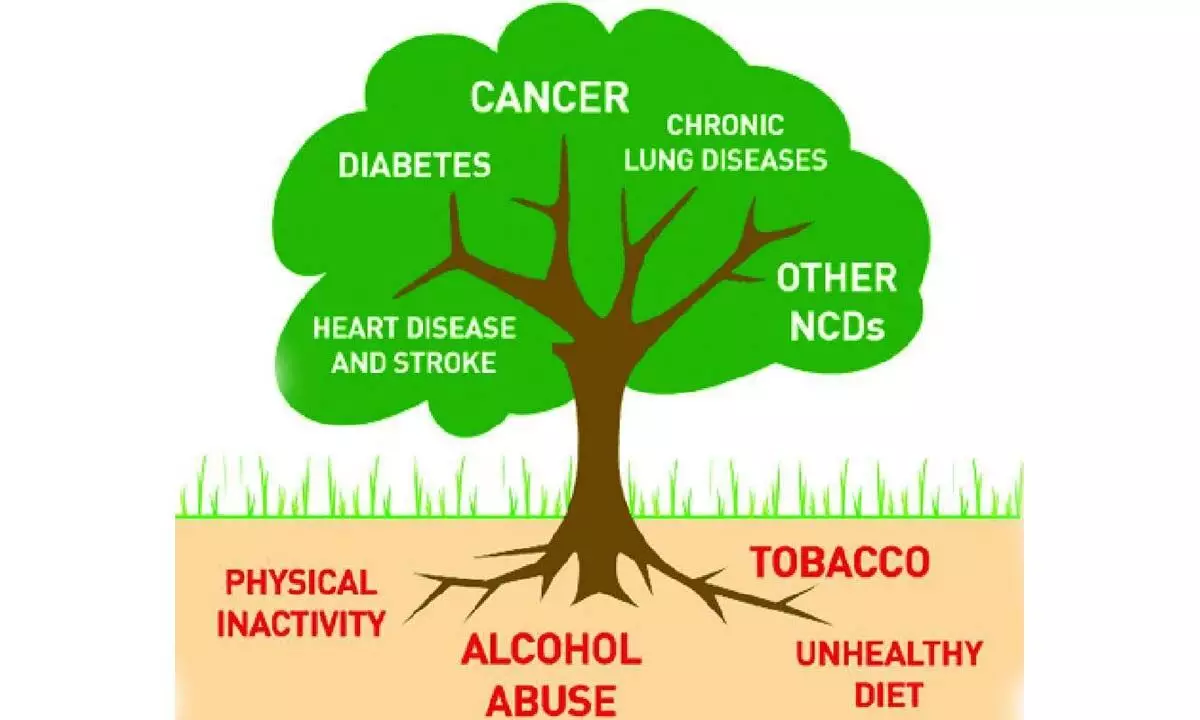Prevention: The ultimate solution for non-communicable diseases

Prevention: The ultimate solution for non-communicable diseases
NCDs account for 2 out of 3 fatalities and in India, NCDs were responsible for 60.1 lakh deaths, the majority of which could have been prevented
Bengaluru: Non-communicable diseases (NCDs), which are mainly preventable, are said to account for over 74 percent of fatalities globally, according to the World Health Organisation (WHO). Commonly, unhealthy behaviours or environmental factors lead to NCDs. In India, NCDs were responsible for 60.1 lakh deaths, the majority of which could have been prevented.
NCDs account for 2 out of 3 fatalities. In addition to maternal mortality, under-5 childhood mortality, malnutrition, and infectious diseases, India is now severely affected by NCDs, adding to the already crowded public health agenda. In urban areas, up to 3 out of every 4 adults have diabetes or pre-diabetes.
Heart disease is the number one killer in the world, for men and women says Dr. Nalini Saligram, CEO and Founder, Arogya World. "Indians are very badly hit by NCDs – including heart disease, diabetes, hypertension, cancer (including Oral Cancer, Cervical cancer) chronic lung diseases, and mental health. India is a diabetes capital and a heart disease capital. India accounts for approximately 60 per cent of the world's heart disease burden. Moreover, Indians get diabetes in their 30s some 10-20 years earlier than people in the West, at the peak of their productive years. And since India is a young country with median age 27 years, the public health impact over the next several years is truly alarming," she added.
Educating individuals to be aware of NCDs plays a vital role in preventing such diseases. Children should be taught the fundamentals of healthy living before their lifestyle patterns are fully formed in order for them to be healthy as adults. Thoughtful programmes must be designed to approach and instruct adults on how to improve their lifestyle.
"If we go to the young – adolescents, young working adults – in thoughtful ways, with well-designed programs, we as a society can go far. Middle-school children 11-14 years old are old enough to understand the significance of what they are learning and excited to learn new things – they are like sponges at that age, absorbing new tenets and concepts and using their pester power to influence their families as well. Young adults younger than 30 are important because we must reach them before they get diabetes. That is why schools and workplaces are important platforms for diabetes prevention. We can scale our impact by working with government, with other NGOs and with companies and their Corporate Social Responsibility (CSR) efforts," she explained.
Several strategies are being deployed for the prevention of NCDs in India. "The country has stepped up and invested in NCD screening in major ways and has also taken steps towards universal health coverage with Ayushman Bharat covering catastrophic healthcare expenses incurred mostly due to NCDs, for 100 million poor families. The country is also investing in setting up health and wellness centres and in training Accredited Social Health Activist (ASHA) workers about NCDs. Furthermore, India has developed digital backbones to track and manage annual screenings, knowing that early detection and referral for treatment can save lives. But more can be done to insert prevention into these existing NCD efforts," she added.
Two major reasons for the spike in NCDs include rapid urbanisation and unhealthy lifestyle. "India is urbanising rapidly, with more and more people moving to cities to look for jobs, and urbanization itself is one of the systemic reasons for NCDs. Modern, sedentary, convenience lifestyles and the aggressive marketing tactics of Big Food and Big Tobacco are other reasons for NCDs exploding during our lifetimes to becoming one of the biggest health and development challenges of the century. India's healthcare system is weak – as was shown quite starkly during COVID – with not enough doctors and hospitals to provide the healthcare needed. Employers also can do more to improve the physical and mental health of their employees and the communities they live in," commented Dr. Nalini.
Prevention is the smart solution. "We know that according to WHO and compelling clinical studies that 80 per cent of heart disease, 80 per cent of diabetes and 40 per cent of cancers can be prevented with 3 lifestyle changes – we must eat right, increase physical activity, and avoid tobacco.
This is what can help us prevent diabetes in the first place and prevent it from worsening or leading to kidney disease or stroke or blindness, and very poor quality of life. It also is important in this post-COVID era, to remind everyone that it is people with underlying diabetes who are the most likely to be hospitalised, the most likely to need ICU care and the least likely to survive COVID," she concluded.














